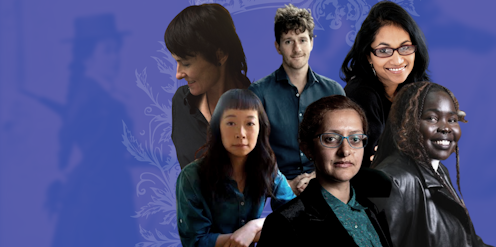
This year’s Miles Franklin shortlist takes us from Sydney’s criminal underclass in the 1930s and the quiet waters of rural Tasmania in the 1940s to shopping for design objects in contemporary Japan.
Its styles range from the sparse, economical prose of the experimental novella to an intricately plotted page-turner.
And the six shortlisted writers include a debut novelist and a Miles Franklin veteran; just one is male-identifying.
Iris by Fiona Kelly McGregor
Iris is an impeccably researched biographical novel that brings to life Sydney’s inner-city Darlinghurst and Surry Hills, circa 1930s, in a way reminiscent of Ruth Park. McGregor is the most experienced writer on the shortlist: Iris is her eighth book and her accolades include a Steele Rudd Award and an Age Book of the Year (Indelible Ink).
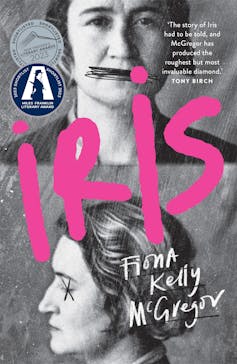
McGregor knows Sydney well – especially its convoluted history of colonialism, repression and disobedience. Her inspired decision to fictionalise the real-life Iris Webber (1906-1953) was no doubt influenced by the extraordinary archives of the Sydney Police photographs (1912-1948).
Webber’s daily struggle against the dark forces of law and order, the patriarchy, the heteronormative presents as a poetic victory for the queer, the poor and the lawless. The criminal hero is no stranger to Australian readers: mostly men. But McGregor’s Webber, as “bad” and unforgiving as they come, is a welcome turn.
Iris is a sophisticated queering of the archives. It’s also an extraordinary recuperation of lower-working-class Sydney’s Depression-era vernacular, with much of its sexist, racist, homophobic implications intact. This is a novel full of sex, music, drugs, drink and laughter. I loved that about it.
A lengthy book, there are some slow points in the long middle, and a vast cast of characters to keep in check. But its strengths are myriad. McGregor is a writer with vision, intellect, commitment and flair.
Read more: In Iris, Fiona Kelly McGregor recreates the criminal underworld of Depression-era Sydney
Cold Enough for Snow by Jessica Au
Jessica Au’s novel was much anticipated: its manuscript won the inaugural international $US10,000 The Novel Prize, trumping 1500 entries. It since won the Victorian Premier’s Award for Fiction, The Victorian Prize for Literature and the Readings Prize for New Australian Fiction.
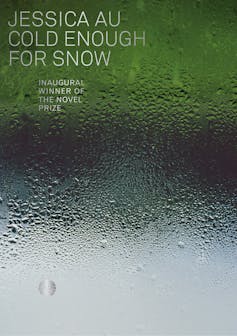
Au’s mastery of the novella feels like a long, nourishing drink at the best kind of literary waterhole. Influenced by the autofiction of Rachel Cusk, Ben Lerner and Elizabeth Strout, it’s not a plot-driven book.
The Melbourne-based narrator and her ageing mother take a holiday to Japan: it’s that simple. The setting is contemporary. The narrator’s observations of the everyday aspects of the journey – negotiating transport, admiring design objects in speciality shops, a long walk through an unfamiliar landscape – accumulate with a hypnotic persistence.
There is a subtle search for meaning, particularly regarding the nature of intergenerational relationships. But Au also nudges us to contemplate the personal impact of tourism, art, migration, settlement and resettlement – and some of the more subtle aspects of cultural difference.
Ultimately, we’re left with a slightly discomforting sense of the unknowability of the other, and light existential distress. It’s a credit to Au that she lets the reader sit with this at the conclusion: nothing feels artificially resolved.
Read more: The responsibilities of being: Jessica Au's precise, poetic meditation on mothers and daughters
Limberlost by Robbie Arnott
Robbie Arnott is the only one of these authors to have been shortlisted for the Miles Franklin before – for his second novel, The Rain Heron (2020), which won The Age Book of the Year award. Arnott is also the only male-identifying author on this shortlist and masculinity is a central theme.
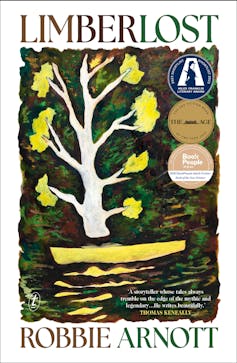
Ned, 14, the youngest of four children, lives on the family orchard on the banks of Tasmania’s Tamar river, during the second world war. His mother is dead, his emotionally distant World War I veteran father suffers PTSD, and his older brothers have enlisted. When Ned’s older sister returns home – suddenly and heartbroken – he does his best to win her approval.
Set over a single summer, the plot is simple but satisfying. Arnott’s capacity to bring the setting and characters vividly to life makes for a fully immersive reading experience. It’s inspired in part by Arnott’s grandfather, who grew up where the book is set. The book would make a good screenplay.
I was slightly irritated by an overreliance on flashbacks to a particular childhood experience, its full details gradually drip-fed to the reader. Arnott’s talent for plot and extraordinary skill for verisimilitude make the novel compelling enough on their own.
Read more: Robbie Arnott's eco-fiction uses myth and metaphor to depict a wounded world
Hopeless Kingdom by Kgshak Akec
Kgshak Akec, a creative writing student at Deakin University, is the youngest writer on this shortlist, at 26. Super excited, she says she’s “still processing” the news.
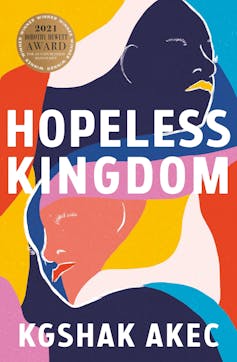
Akec’s debut is inspired by her family’s migration from South Sudan to Australia via Egypt, during the early 2000s. It’s told interchangeably from the perspective of Akita, aged six and in her first year of school when we meet her, and her mother Taresai in Cairo. The novel opens with Taresai, sole proprieter of a successful bootleg liquor business, making hospital visits to sit with her premature fourth child.
This manuscript won the Dorothy Hewett Award in 2021, following inaugural winner Josephine Wilson (2015) – who then swept up the Miles Franklin for Extinctions.
One of Akec’s strengths is in rendering accomplished scenes that are active, tense, crowded and fast-moving. The book brims with authentic, memorable characters and relationships between family and friends that are complex and subtly complicated.
Akito’s big brother Santo, older by two years, will live on in readers’ memories: many will recognise this heartbreakingly fun risk-taker, who takes all who know him on the wildest of rides.
The novel is a bit lopsided at times. Akito’s point of view is consistently vivid, while Taresai’s often lacks immersive sensory detail. I wish Akec’s editors had worked harder to help correct this imbalance. But hers is a vivid, exciting new voice.
The Lovers by Yumna Kassab
The Lovers is this shortlist’s most experimental work. Told through short vignettes that switch from one lover’s point of view to the other, Kassab’s technique allows plenty of space for the reader to fill in the gaps, and the freedom to imagine the fuller setting and its attendant complications.
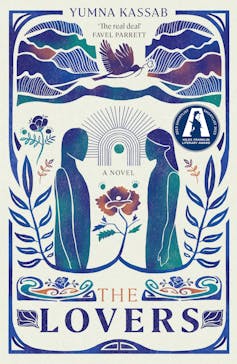
This novella’s limited dramatic narrative scale permits the author a sophisticated attention to the poetics of representation: perhaps the book’s key achievement. It’s an accomplished, deeply feminist exploration of contemporary romance.
Amir and Jamila, the lovers of the title, unite almost exclusively at nighttime. In Jamila’s rented room, in a city foreign to her, their mutual desire ignites and deepens.
Amir has a failed marriage behind him, but remains committed to the institution. His means are limited by poverty and a government that can’t be trusted; his choices reduced by a conservative, patriarchal culture. Jamila’s privileges of class and foreign citizenship free her to come and go as she pleases.
Marriage is a trap Jamila neither wants nor needs. She’s seen what it does to other women. A tourist in her father’s birth country, she stays longer than intended – partly to explore what her love affair might become. The lovers keenly feel their differences. Their possible futures are much contemplated: in the privacy of their bedroom and the seclusion of their own thoughts. A great deal hinges on what might happen next.
The Lovers is Kassab’s third novel. She artfully employs stories within stories: tiny parables that frame or commentate on the larger story of the lovers and their fate. Even the author’s notes are unconventionally playful and poetic. I loved this honest, clever, powerful work.
Read more: Colonial and nationalist myths are recast in Yumna Kassab's Australiana
Chai Time at Cinnamon Gardens by Shankari Chandran
Chai Time at Cinnamon Gardens is mostly set in a Western Sydney nursing home, run by and for a Sri Lankan Tamil community. Shankari Chandran says the novel was inspired and informed by regular visits to her grandmother. “As she was walking, she’d be talking, and telling us stories about her life, of her childhood, of her marriage, her migration.”
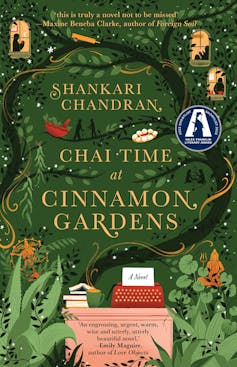
Chandran is a mid-career author whose achievements are gradually accumulating. Her debut novel, Song of the Sun God, was longlisted for the International Dublin Literary Award and shortlisted for Sri Lanka’s Fairway National Literary Award. A lawyer, her interests lie in dispossession, erasure and connection. Accordingly, this novel reflects on racial violence, xenophobia, cultural erasure and truth-telling.
The outer-suburban nursing home of the book’s title at first conjures an idyllic suburban utopia, a “new” Sri Lanka for Tamil residents in their final days. But uncomfortable truths about ethnic and race-based violence, xenophobia and misplaced investments in the myth of nationhood soon rupture the idyll.
The struggle to peacefully co-exist in a multi-ethnic community is the focus: both in contemporary Australia and the Sri Lanka many key characters have fled. Chandran gives us complex interiorities and a racing plot, relayed through multiple perspectives – bringing the emotional, physical and intergenerational impact of deliberate mass cultural erasure sharply into view.
But I sometimes wished for a slower, simpler, less performative approach to plot, to give me more time to sit with the book’s extraordinary characters and properly absorb its ideas.
Correction: the original version of this article stated that Jessica Au won $US100,000 for the Novel Prize; it was $US10,000. It also stated that Cold Enough for Snow was her debut, but it was her second novel. And that Josephine Wilson’s Extinctions won the Dorothy Hewett Award in 2020 and the Miles the next year; it won the Dorothy Hewitt in 2015 and the Miles in 2017. The article has been amended accordingly.
Julienne van Loon receives funding from Creative Victoria and the Australia Council for the Arts.
This article was originally published on The Conversation. Read the original article.







